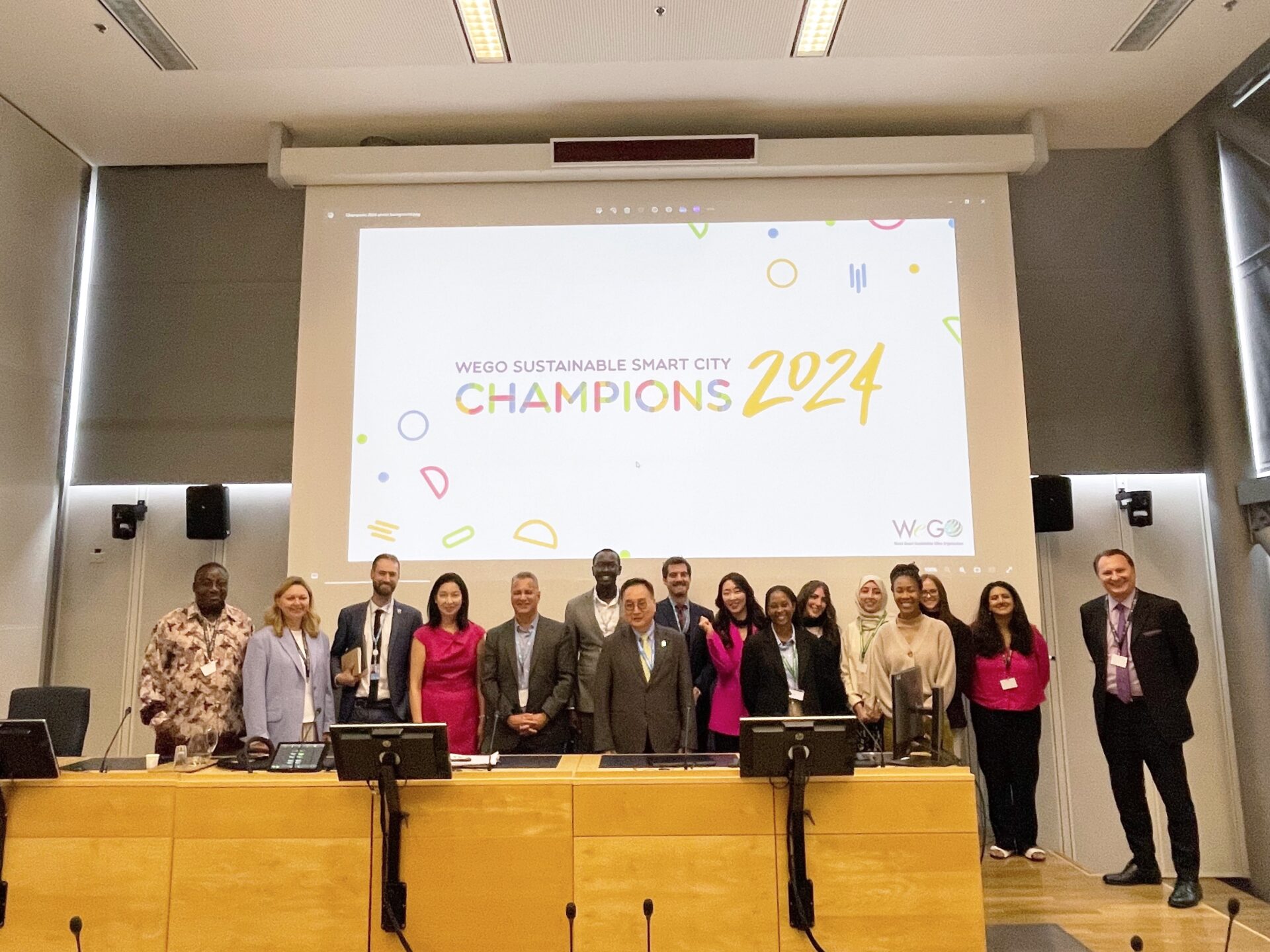From Tech Barriers to Digital Bridges: Exploring Technology’s Role in Advancing Spatial Justice
Geneva, May 29th – In a rapidly evolving digital era, the concept of spatial justice, ensuring fair distribution of resources, opportunities, and services across different physical spaces is more critical than ever. This topic was the focus of a session titled “From Tech Barriers to Digital Bridges: How Can Technology Advance Spatial Justice?”. This event was co-organized by the United for Smart and Sustainable Cities (U4SSC) initiative by the University of Geneva, and the World Smart Sustainable Cities Organization (WeGO) for the WeGO Smart Sustainable Champions initiative during the WSIS+20 High-Level Event in Geneva, Switzerland.
WeGO has expanded the Champions program to a hybrid where the program will be conducted online and in-person. The program consists of a firestarter and an interesting panel discussion around technology and spatial justice.
The moderator, Danil Kerimi, Dean of WeGO Smart Sustainable Champions gave the welcome remarks to start off the session. To open up the event, Jung-Sook Park, Secretary General of WeGO gave the opening remarks, setting the stage for the discussions.
“WeGO believes in the power of youth to shape the future of our cities. By engaging in this program, you are not only gaining valuable skills but also taking on the responsibility of leading your communities towards a more sustainable and inclusive future” said the Secretary General.
During the panel, Alexis Gatoni Sebarenzi, former city official of Kigali City, Rwanda acted as the firestarter to bring the initial discussion forth. Panelists included Dr. Alexandre Hedjazi, Deputy Director Foreign Affairs University of Geneva, Prof. Matteo Tarantino, Catholic University of the Sacred Heart of Milan, and Eunbyul Cho, Head of Department of WeGO.
In the panel, the acceleration of urbanization and technological advancements shaping modern societies, and the pressing issue of spatial justice was addressed. Spatial justice refers to the equitable distribution of resources, opportunities, and services within cities, ensuring that all residents, regardless of socio-economic status, have equal access to the benefits of urban development. This session explored the relationship between digital technology and spatial justice, emphasizing the significant role technology can play in creating more inclusive and just urban environments.
Drawing on various experiences, the session brought academic insights and diverse perspectives from disciplines such as geography, sociology of technology, city planning, anthropology, and the perspective of an international organization. All tied together to contemplate in a dialogue with the key themes:
Digital Inclusion and Accessibility: The session will discuss the multifaceted roles of technology in granting accessibility to resources and services for marginalized communities. Special focus will be on the potential of geographic information systems (GIS) to address or inadvertently foster discrimination.
Smart Cities for All: Exploring the concept of smart cities that prioritize inclusivity, sustainability, and social equity, the discussion will examine how digital technology, alongside other tools such as nature-based solutions, can enhance the quality of life for all urban residents.
Data for Decision-Making: Analyzing the role of data-driven decision-making in urban planning, this theme will focus on ensuring that policies are equitable and address the needs of diverse populations, particularly in resource-scarce contexts where data collection can be challenging and expensive.
Community Engagement: Highlighting successful initiatives where technology facilitates community participation, this theme will demonstrate how digital tools can empower residents to actively contribute to the development of their neighborhoods, fostering a sense of ownership and inclusion.
This session raised awareness about the impact of spatial justice in urban development. By sharing different practices and innovative solutions for leveraging technology to bridge the digital divide. As WeGO Smart Sustainable Champions target audience is the university students, this dialogue can especially inspire the youth to get involved in strategizing actions to promote the importance of spatial justice and the future of smart cities.
About WeGO
The World Smart Sustainable Cities Organization (WeGO), is a membership-based international association of local governments, smart tech solution providers, and institutions committed to the transformation of cities into smart sustainable cities through facilitating public-private partnerships (PPP). WeGO was founded by 50 member cities in 2010 as the World e-Governments Organization, hence our acronym. In response to the evolving concept of smart cities, WeGO expanded its vision and mandate at the 7th General Assembly (2017) and its name to the World Smart Sustainable Cities Organization. WeGO’s Secretariat is based in Seoul, Korea, and has regional offices in East Asia (Chengdu, China), the Mediterranean (Beyoglu, Turkey), Africa (Abuja, Nigeria), Middle East & North Africa (Abu Dhabi, United Arab Emirates), Latin America (Cuenca, Ecuador), and Central Asia (Almaty, Kazakhstan). As the leading platform on smart city development, WeGO’s mission is to share knowledge and good practices in e-Governance; strengthen administrative efficiency and transparency; advance digital capacity; facilitate civic involvement; bridge the digital divide and inequality; and promote cooperation solidarity among cities and local governments around the world.
WeGO serves for its members as their international platform to improve the quality of life, innovate in the delivery of public services, and strengthen regional competitiveness.
Press Contact:
Name: Kakim Danabayev
E-mail: kakim@we-gov.org
Phone: +82-70-4202-9169


